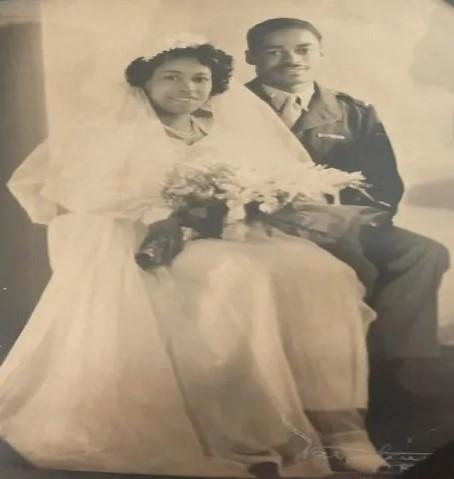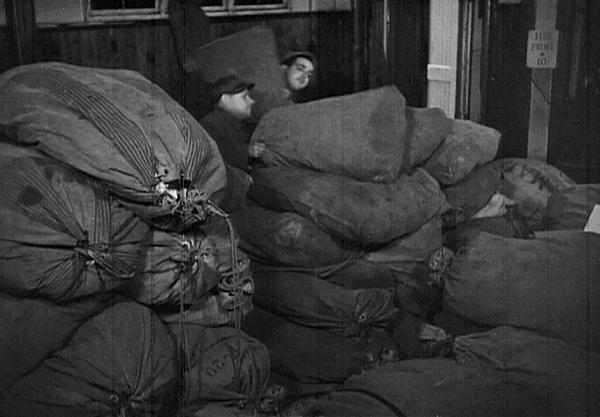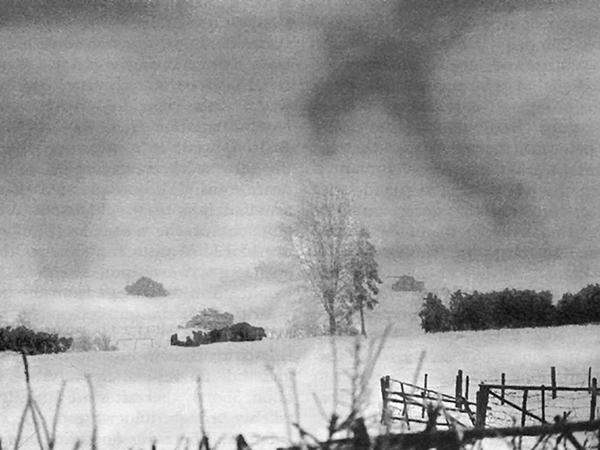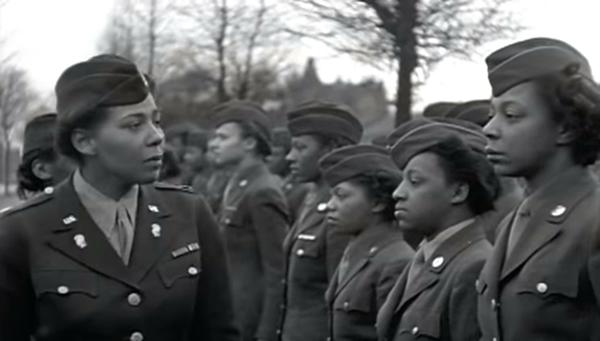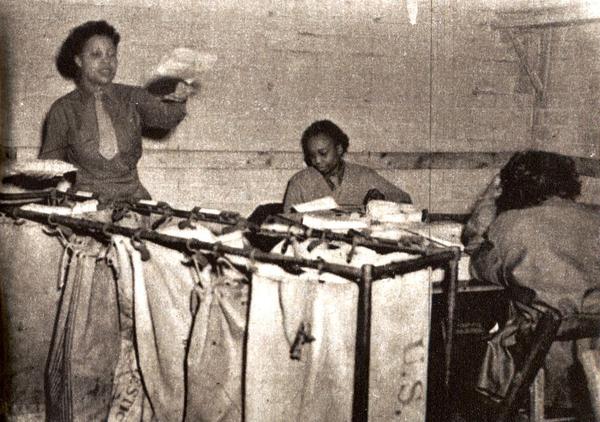September 1, 2023 Hello , Writers know not all their stories will get published. Here's one of mine that got away. One of the them was about the 761st Tank Battalion, an all-Black U.S. Army unit that arrived in the nick of time to fight in one of the most crucial moments of WWII. This week I discovered that a tank commander from the 761st married one of the women from the
6888th Postal Battalion, the unit of WWII Black women I wrote about in my book. I'm taking this opportunity to give you a peek into a story that never became the book I imagined.
Here's the Story that Got Away
Vivian Elzie grew up in Crisfield, Maryland, in the 1920s. The seafood capital offered plenty of jobs picking crab meat or shucking oysters, but Vivian left home
for better opportunity in Philadelphia where she trained as a secretary and dental assistant. Elyseo Jose Taylor grew up on the south side of Chicago in a family
with a long tradition of military service. He lied about his age to sign up for the National Guard at age 16 and made sergeant in a field artillery unit. I ran
across the story of Vivan and Elyseo earlier this week in the AFRO News, in a published article by Col. (Ret.) Edna W. Cummings. They were not part of my book proposal. After WWII broke out, they both joined the segregated army in 1942. They were eager for opportunity, adventure and to serve their county. It would be three years, and a war Elyseo almost did not survive, before they would meet and marry.
Photo: Lt. Elseyo Taylor and Lt. Vivan Elzie, donning their best threads to get married. Lieutenant Taylor
became the second youngest commissioned officer in the U.S. Army at 19, when he graduated from officer training at Fort Sill, Oklahoma. He held several assignments over the next couple years before being shipped overseas as a tank platoon leader in the 761st Tank Battalion. He landed at Omaha Beach in October 1944 serving in General George S. Patton’s Third Army. General Patton welcomed the battalion. “Men, you’re the first Negro tankers to ever fight in the American Army," he said. "I would never have asked for you if you weren’t good. I have nothing but the best in my Army.” In truth, the army had lost so many soldiers, they were finally forced to take advantage of the segregated units they'd left sitting stateside. Initially, Taylor worked as a combat
engineer blowing up hedgerows to eliminate German defensive positions. A month after arriving in France, the 761st joined savage fighting in Belgium along the German border and suffered heavy casualties, 81 wounded and 24 soldiers killed in action and 34 tanks lost or damaged. Though Lt. Taylor suffered a minor wound; he felt sidelined in the war and wrote a letter to General Eisenhower asking for reassignment. His rquest was approved and shortly he became a tank commander. Meanwhile Vivian Elzie, had enlisted with the Women’s Army Auxiliary Corps in 1942 and stayed on the following year when it became Women’s Army Corps (WAC). She was selected for Officers’ Candidate School in 1944 and graduated in December at Fort Oglethorpe, Georgia. She didn't know it then, but letters and packages sent to soldiers in Europe had been piling up for two years due to lack of staff to reroute mail to soldiers who were always on the move. Vivian would be shipped overseas to help deal with the
problem.
Backlog of US military mail, Birmingham, England 1945. In late 1944, Allied forces had push Nazi troops across Europe and back into Germany, it seemed the war in Europe was all but over. Then in mid-December, the German army launched a counteroffensive intended
to cut through the allied forces and turn the tide of the war in Hitler's favor. The month-long "Battle of the Bulge" that ensued was the largest and among the
bloodiest battles in the European Theater of Operations. December 23-24, the height of the battle, 610,000 allied men joined the fighting. The most crucial point came
when the Germans threatened to overrun American defenses in the Ardennes Forest, cut the Allied line in two and surge back into France. The 761st Battalion powered through extreme cold and heavy snow to reach the battle and help stop the German advance. The fight continued until mid-January.
Sherman tanks in combat, January 1945. Courtesy US Army. During the Battle of the Bulge, Lieutenant Taylor received his second wound of the war when he was high in the thigh by a shell
fragment. He was able to keep fighting. No mail was getting through to the soldiers from home. In Birmingham, England, six airplane hangars sat filled with Christmas
packages returned to the UK from the continent because it was impossible to deliver them during the Battle of the Bulge. At Fort Oglethorpe, GA, the army was recruiting
Black WACs to ship overseas on a special assignment. In February 1945, two groups of women totaling 855 sailed to England. The 6888th Postal Directory Battalion, under the direction of Major Charity Adams tackled the hangar stacked with mail. Lieutenant Vivian Elzie was one of 31 officers in the 6888th. Her job was the assistant mess officer, managing the mess hall for the WAC unit.
Major Charity Adams inspects her troops in Birmingham, England, February 1945. The WACs of the 6888th worked around the clock, seven days a week. They patched boxes of cookies, deciphered torn envelopes, re-addressed and resent uncountable pieces of mail to the soldiers. "Some people didn't understand about addressing letters, so they would just write a letter to their son or husband addressed 'To Junior,
U.S. Army' or 'To Sam, Army,' " said Mary Crawford Ragland, the clerk of the 6888th. "It was our job to figure out who those soldiers were and get them their mail."
"The longer we were away from home, the more we understood what had become sort of a motto “No mail,
low morale.”
Black women of the U.S. Army 6888th Postal Directory Battalion sort mail
in Birmingham England, 1945.
The 6888th broke all records for redirecting mail. Three eight-hour shifts averaged more than 65,000 pieces of mail a day. Long-delayed letters and packages reached battle casualties who had been moving too frequently for mail to catch up with them. When the Battle of the
Bulge was won, the 761st Battalion crossed the Rhine River and advanced into Germany. Taylor's tank took a hit, and he was wounded again, this time more seriously. Even so, he managed to move his tank and others to safety where he received medical treatment. For valor while injured, he received a Purple Heart and a Silver Star. Lt. Taylor was sent a hospital in England to
recuperate from his injuries and that's where he and Lt. Elzie met. After a brief courtship, he proposed. The two army officers married September 20, 1945, at the American Pro-Cathedral of the Holy Trinity in Paris. In 1978, President Jimmy Carter awarded the 761st, a Presidential Citation. A bill has been introduced in Congress to award the unit a Congressional Gold Medal. The 6888th Postal Directory Battalion was awarded a Congressional God Medal in February. Tony-award nominee Blair Underwood is developing a new Broadway-bound musical based on the battalion and a movie is in the works, too!
Like my article today? Please share:
Sources https://afro.com/the-untold-story-of-a-761st-black-panther-and-the-6888th-elzie-sisters/
Follow me on social media
Read a great book? Have a burning question? Let me know. If you know someone who might enjoy my newsletter or books, please forward this
e-mail. I will never spam you or sell your email address, you can unsubscribe anytime at the link below. To find out more about my books, how I help
students, teachers, librarians and writers visit my website at www.MaryCronkFarrell.com. Contact me at MaryCronkFarrell@gmail.com. Click here to subscribe to this
newsletter. |
|
|
